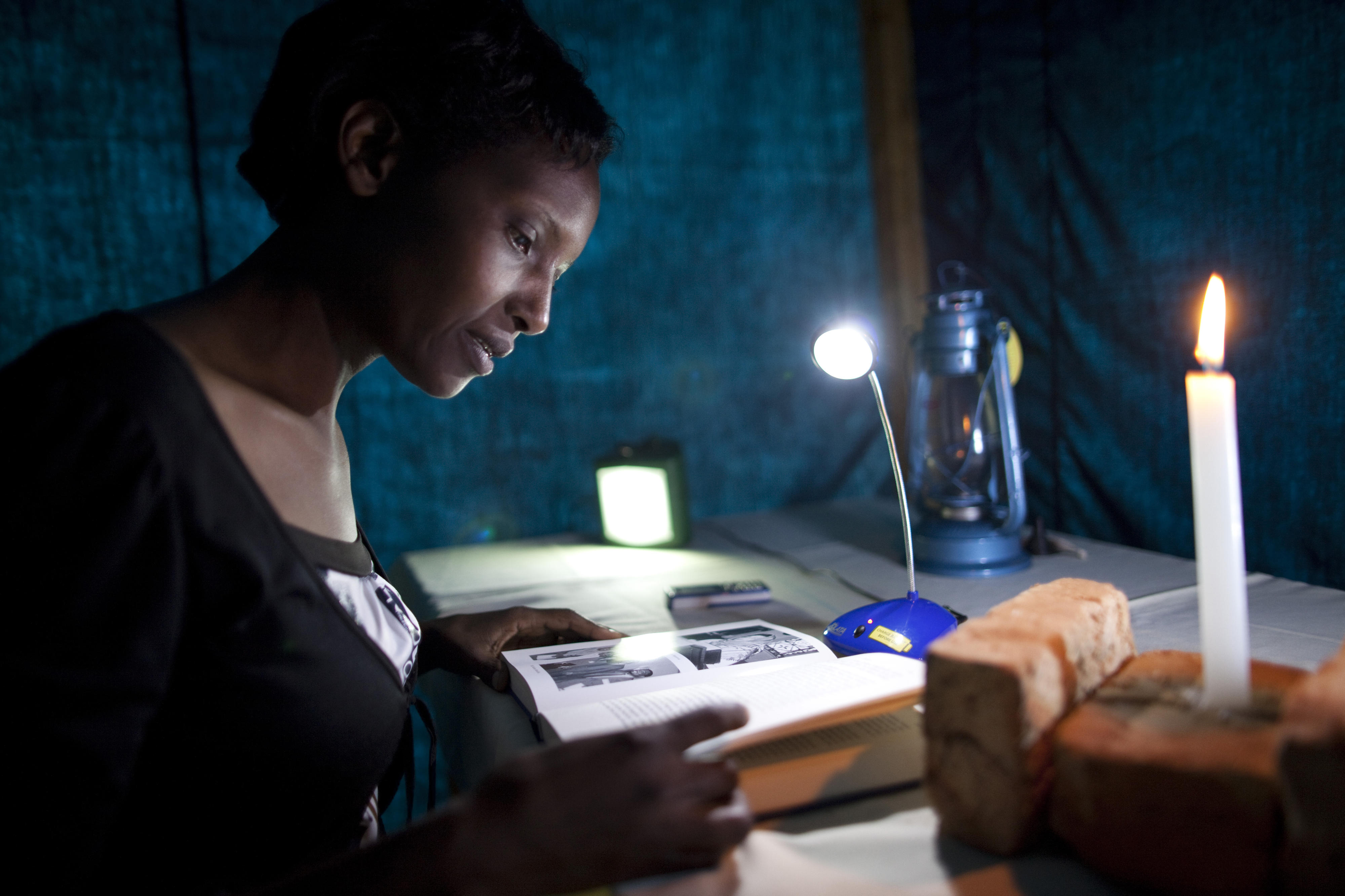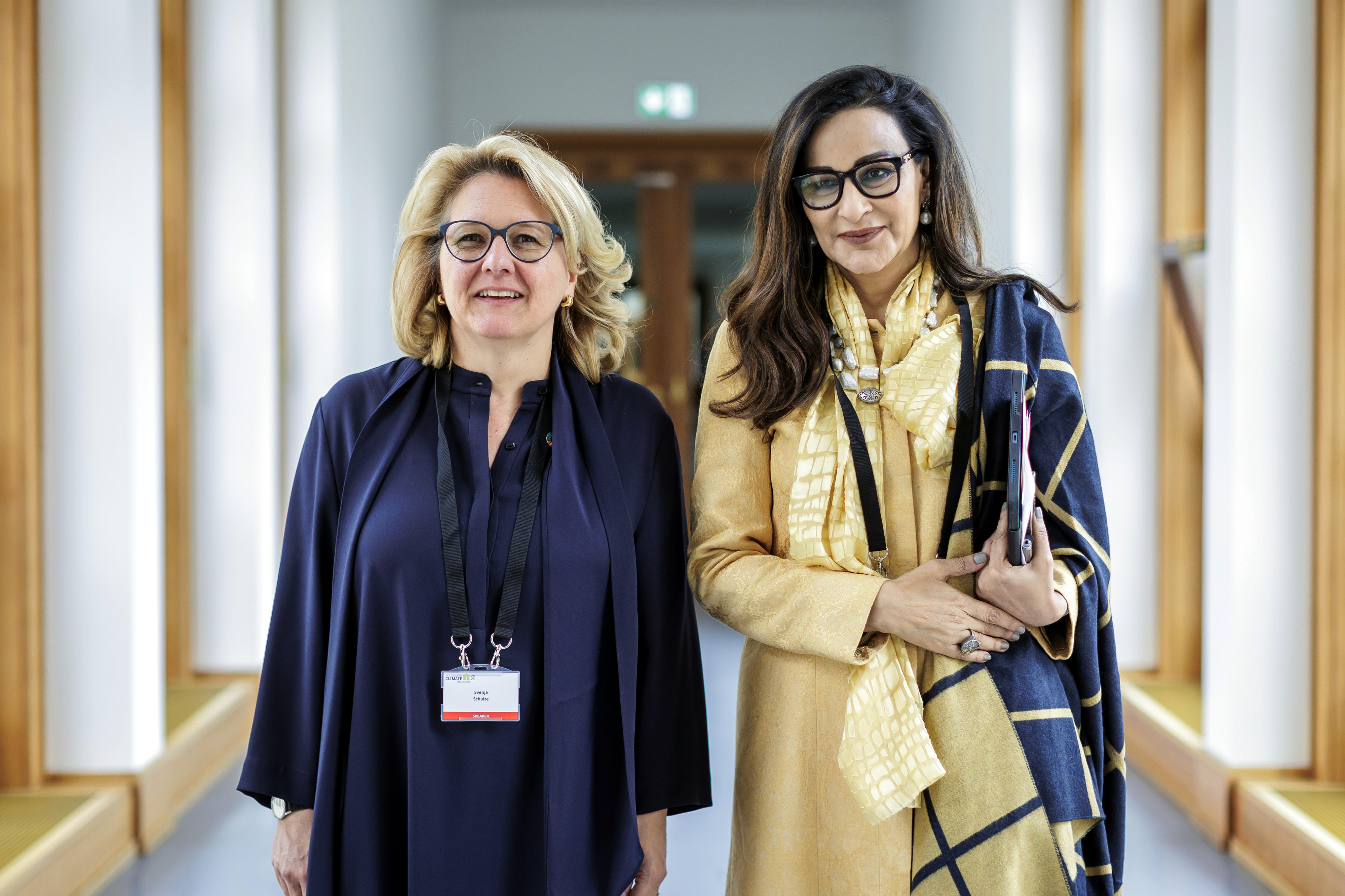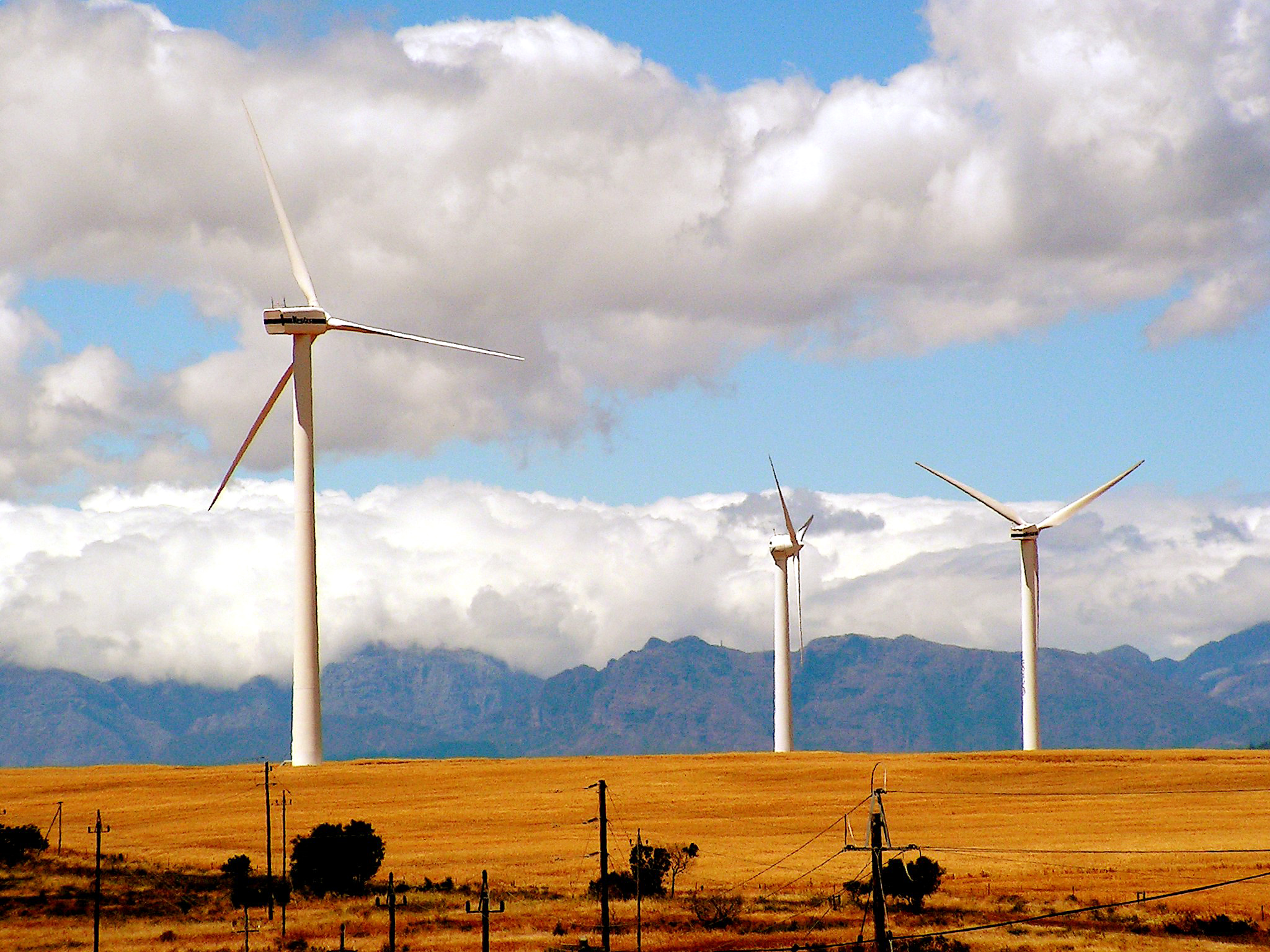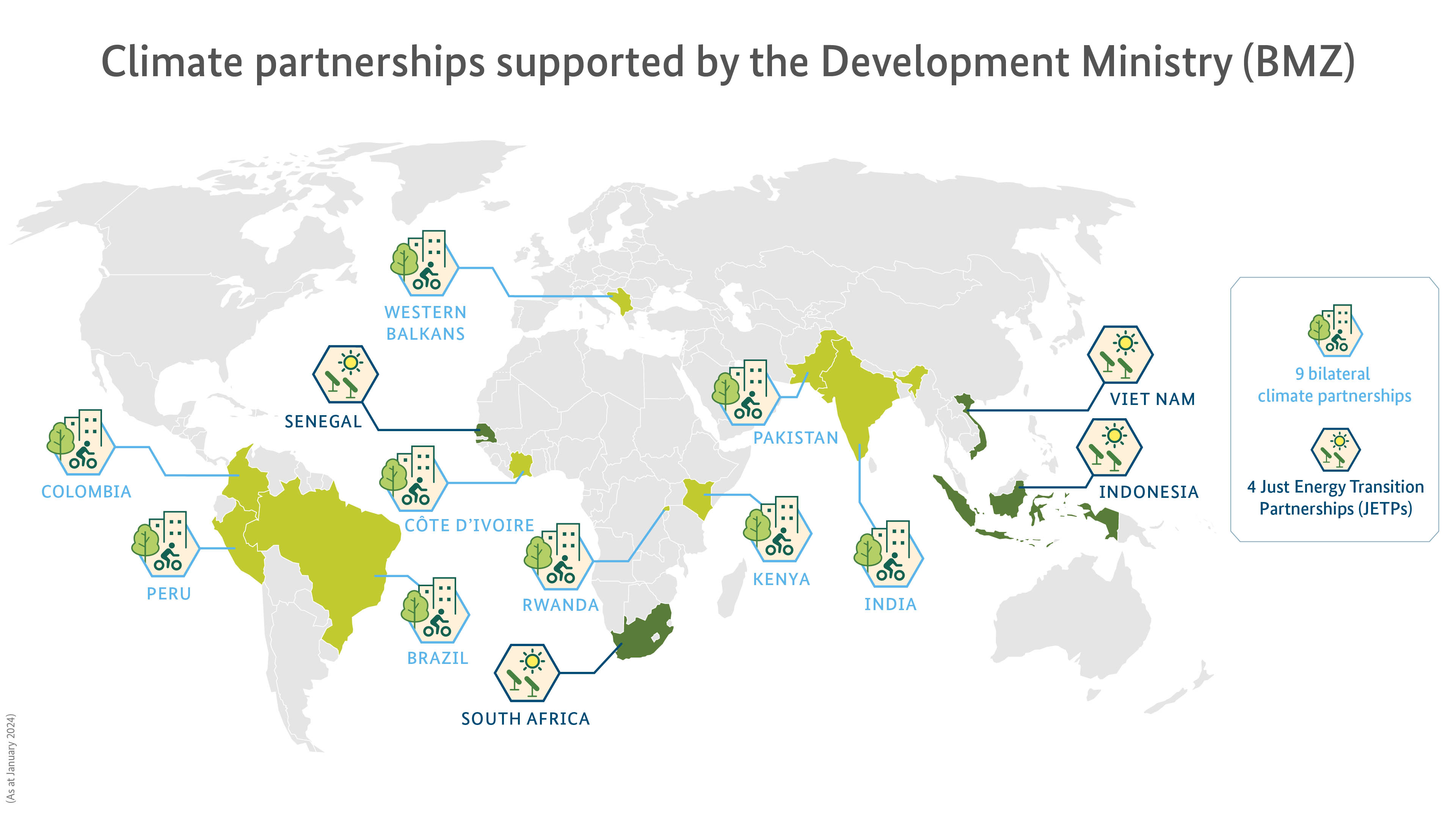Climate change and development Climate and development partnerships
The Federal Ministry for Economic Cooperation and Development (BMZ) supports ambitious partner countries through bilateral Climate and Development Partnerships and through plurilateral partnerships within the framework of the G7 (Just Energy Transition Partnerships – JETPs).
The aim is to work with developing countries and emerging economies on raising the level of ambition for achieving the 1.5˚C target set in the Paris Agreement while progressing the implementation of the 2030 Agenda and its Sustainable Development Goals (SDGs) at the same time. The idea is to link climate and development objectives in order to show that equitable, climate-oriented structural change based on gender equality can help to advance society. Partners are both emerging economies that produce a lot of greenhouse gas emissions and developing countries that are especially engaged in climate action.
Through its support for ambitious climate targets and its involvement in international initiatives, Germany – via the climate partnerships – is expanding its global climate policy network and thus building alliances for the future.
The tailor-made partnerships build on the partner countries’ national plans and strategies (including the Nationally Determined Contributions – NDCs) and promote a broad-based social-ecological transformation of the economy and of people’s lifestyles. The financial resources committed within the framework of the partnerships will be pooled and substantially increased, for instance by involving the development banks, the private sector and philanthropic organisations.
Together with a number of other partners, the German government has also established the global NDC Partnership to support emerging economies and developing countries in realising their NDCs and the SDGs. It is an inclusive format in which a large network of over 200 members can provide quick and uncomplicated support to the partner countries so they can meet their development and climate-related needs. This has a transformative impact.
Just Energy Transition Partnerships (JETPs)
The global energy transition – moving away from fossil fuels such as coal and shifting to renewable energies – is one of the key tasks in combating the climate crisis. In order to lend additional impetus to this transition, the G7 countries have initiated Just Energy Transition Partnerships (JETPs). Under these partnerships, they work with several emerging economies and fast-growing developing countries, whose energy policies are critically important for global climate action.
The first partnership of this kind was agreed with South Africa at the 2021 UN Climate Change Conference; two further JETPs were agreed in 2022 with Indonesia and Viet Nam and another, with Senegal, in June 2023.
The JETPs are accompanied by further measures under the Partnership for Global Infrastructure and Investment (PGII), a G7 initiative, and also make a contribution to the Climate Club, which, among other things, supports committed developing and emerging economies in consistently advancing the transformation of their industries with the goal of becoming climate neutral.
Just Energy Transition Partnership Example: South Africa
France, the United Kingdom, the United States, the European Union, Canada and Denmark are working alongside Germany in support of South Africa's efforts to move forward on its exit from coal and substantially expand its renewable energies. As South Africa plays a major role as a regional electricity supplier, this partnership will have an impact beyond its national borders as well.
The initial funding for the JETP amounts to 8.5 billion US dollars; Germany's contribution, after several increases, is 1.1 billion US dollars (including 1 billion US dollars via the BMZ). The aim is to enable South Africa to avoid up to 1.5 gigatonnes of greenhouse gas emissions over the next 20 years. In order to ensure a socially just coal phase-out, funds will be invested in, for example, employment opportunities for women and young people, in small and medium-sized enterprises, and in future sites for further developing innovative technologies such as green hydrogen and electric vehicles. In addition, support will be provided for many of the more than 90,000 mine workers in South Africa, enabling them to seek new employment opportunities.
Bilateral Climate and Development Partnerships
Within the framework of the Climate and Development Partnerships agreed at intergovernmental level, the BMZ assists developing countries and emerging economies to step up their efforts to achieve the Paris climate targets. Such partnerships currently exist with Pakistan, Rwanda, India, Peru, Kenya, Colombia, Côte d’Ivoire and Brazil, and the first regional partnership has been launched in the Western Balkans. The BMZ is involved in discussions with further countries.
In addition to cutting greenhouse gas emissions, adaptation to the impacts of climate change is a key topic in the Climate and Development Partnerships. The cooperation focuses on the partners’ respective key sectors; examples are energy, natural carbon sinks such as forests and peatlands, sustainable agriculture and urban development.
The starting point is the recognition that a green and equitable transition is a task for the whole of society and that it can only succeed if all sectors and groups are appropriately involved. The Climate and Development partnerships therefore extend beyond intergovernmental cooperation alone and include civil society, the business community and academia.
Bilateral climate and development partnership Example: Pakistan
Pakistan is among the countries that are most severely affected by climate change. As a result of extreme weather events and slow-onset climate change, many people have already become internally displaced.
The Pakistan-German Climate and Energy Initiative was agreed in September 2021. The BMZ is supporting its partner country's efforts to adapt to the impacts of climate change. In order to prevent flooding, for example, reservoirs are being built to collect water after heavy rains, so that water will be available for irrigation and drinking even when there is a drought. The BMZ is also assisting Pakistan in meeting its commitments under its Nationally Determined Contributions (NDCs) and achieving a just energy transition. The BMZ supports not only the restructuring of the economy and energy supply but also the development and expansion of social protection systems. In addition, the partnership particularly aims to strengthen youth participation in climate decision-making.
Moreover, Pakistan is one of the Pathfinder Countries for the Global Shield against Climate Risks, which is designed to better protect vulnerable countries and people against the impacts of climate change.
As at: 14/02/2024







